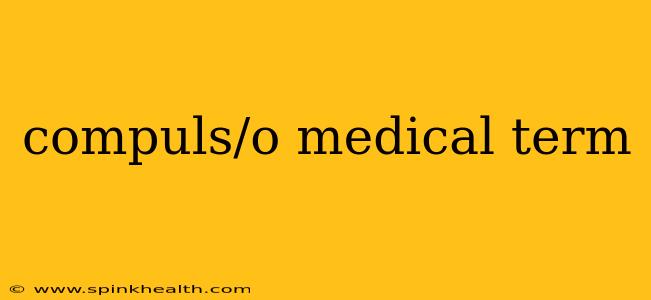Unraveling the Mystery of "Compuls/o": A Deep Dive into the Medical Term
The medical term "compuls/o" might seem daunting at first glance, like a secret code only understood by medical professionals. But fear not! This seemingly cryptic word holds a fascinating story, revealing a fundamental aspect of human physiology and behavior. Let's embark on a journey to decipher its meaning and explore its implications within the vast landscape of medicine.
"Compuls/o" is a combining form, a building block in medical terminology. It originates from the Latin word "compellere," which means "to compel" or "to drive." In the medical context, it signifies a driving force, an irresistible urge, or a compulsion. Understanding this fundamental meaning unlocks its usage across various medical specialties.
What does compuls/o mean in medical terms?
Compuls/o refers to an irresistible urge or impulse to perform an action, often against one's better judgment. This action can range from relatively harmless habits to severely impairing behaviors. The key is the lack of control the individual feels over the compulsion.
Think of it like this: Imagine a strong, almost unbearable urge to do something, even if you know it's not good for you. That feeling of being driven or compelled, despite your conscious efforts to resist, is what "compuls/o" represents.
What are some medical conditions related to compuls/o?
The term "compuls/o" appears in various medical terms associated with conditions characterized by repetitive behaviors and urges. Here are a few prominent examples:
-
Compulsive disorder: This is the most direct application of "compuls/o." Compulsive disorders involve repeated behaviors performed to reduce anxiety or distress, often related to obsessions. The classic example is Obsessive-Compulsive Disorder (OCD), where individuals experience intrusive thoughts (obsessions) and engage in repetitive actions (compulsions) to alleviate the anxiety those thoughts provoke.
-
Compulsive eating: This refers to an overwhelming urge to consume food, often exceeding the body's nutritional needs. It often stems from emotional triggers or underlying psychological issues and can lead to significant health problems.
-
Compulsive gambling: This involves an uncontrollable urge to gamble, despite negative consequences impacting finances, relationships, and overall well-being. The need to gamble often overrides rational decision-making.
How is compuls/o related to other medical terms?
The combining form "compuls/o" is frequently coupled with other terms to form more specific medical words. For instance, combining it with "-ion" creates the noun "compulsion," while "-ive" forms the adjective "compulsive." Understanding these variations is crucial for comprehensive medical terminology comprehension.
Can compuls/o be treated?
Yes, medical conditions involving "compuls/o," such as OCD and compulsive eating, are treatable. Treatment approaches often involve a combination of therapies, including:
-
Cognitive Behavioral Therapy (CBT): CBT helps individuals identify and modify negative thought patterns and behaviors that contribute to compulsions.
-
Medication: Certain medications can help manage symptoms associated with some compulsive disorders.
-
Exposure and Response Prevention (ERP): This specific CBT technique involves gradually exposing individuals to their feared stimuli while preventing their compulsive responses.
Understanding the root meaning of "compuls/o" – the driving force behind irresistible urges – provides a crucial key to deciphering various medical terms and appreciating the complexities of conditions involving compulsive behaviors. It highlights the significant role of psychological and behavioral factors in healthcare and underscores the importance of seeking professional help when dealing with such conditions. The journey into medical terminology is often complex, but by unraveling terms like "compuls/o," we gain a deeper understanding of the human condition and the medical approaches designed to alleviate suffering.

